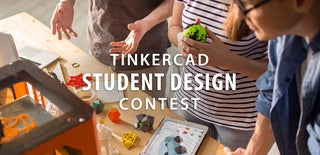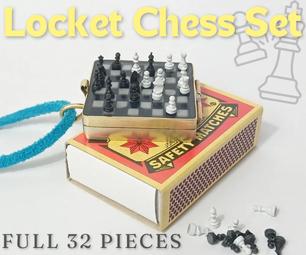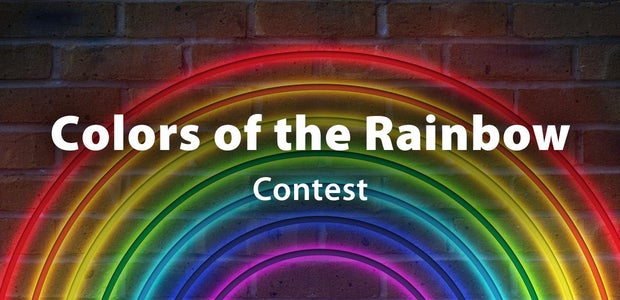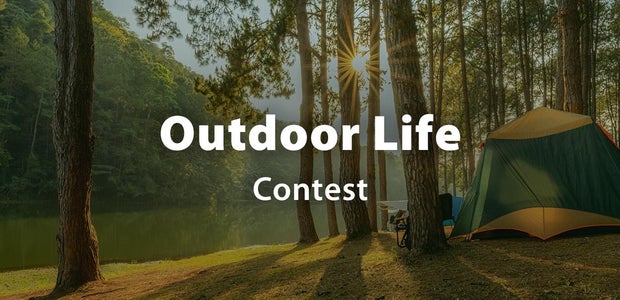Introduction: Starling's Diner (Mashup/Scene)
Hello, this is a model I designed called Starling’s Diner! It’s a mashup between a retro 50's style diner and a space station. It’s also a pretty neat scene as well, and I put a lot of detail into the interior as well as the exterior. Today I will show you how I made this in Tinkercad! The background image on the cover is made with an image by Frank Moth.
Supplies
Tinkercad, a computer, and internet access to make this project
Step 1: Checkerboard Floor
I noticed that many retro diners often had a checkerboard floor, so this was the first thing that I added. It’s made out of one big white rectangle, with lots of little black squares on top of it. In order to reduce the amount of shapes that would be needed, and to save time, I imported an image of a checkerboard instead of actually putting squares one by one on it and having to align each one.
Step 2: Bar
This part took me a while, and is quite detailed compared to the rest of the stuff in the diner. I made the bar with a checkerboard pattern made with little squares . The ridges are made with the rounded cube shape, with the ends cut off and extended. I repeated this shape to make the metal bar thing on the top. I used many small sphere models to make the rivets.
Step 3: Stools
Stools are made up of several different shapes, such as a short cylinder, a tall cylinder, flattened toruses, and a shape called “high resolution tube…” I dont know the exact name because it cut off.
Step 4: Chairs and Tables
Chairs were made with a rectangle shape, and stretched rounded cubes to make the cushions. To make the tables I used a scale square, using the metafillet tool to created the rounded corners. I reused the stand that I used for the stool to make the table stand.
Step 5: Back Wall
Back wall is made of a big rectangle with cutouts. I put another rectangle with another cutout into that cutout to make the metal backing. I made the shelves with the same material as the table, except flattened and stretched out. The door was made with a rectangle with a square cutout in the top and another rectangle for the hand plate.
Step 6: Coffee Machine
I don’t know too much about coffee machines so this is just a rough shape based on one that I found on google images. I took a rectangle and put a trapezoid on top of it and some circles for the heating pads. I put cylinders and more rectangles for the dials and buttons. I made the top with some rounded cubes and another trapezoid for the nozzle thing. To make the coffee pots I used a transparent sphere and another hemisphere. I put a cylinder on top and used the squiggle tool to make the handle as it is rather difficult to replicate with the basic shapes tinkercad gives you.
Step 7: Sign and Box
I made the sign with rounded cubes and I put text on top of them with generic diner foods like hot dogs and cheeseburgers. I made a storage box with a bunch of rectangles and another transparent piece for the glass.
Step 8: Small Details
I made some plates, a napkin holder, and condiments for the details. Plates are made from a torus and a cylinder, and condiments are made with 2 stacked cylinders and a cone on top. I made the napkin dispensers with a semicircle, rectangles, the text tool, and the squiggle tool for the paper. I think the napkin dispenser came out really clean.
Step 9: Frame and Door
The frame is mainly made up of U shaped pieces and some rectangles. I also added some elements from the other part of the build to complete the restaurant shape. The door is made of a rectangle and a torus, transparent rectangles, and some slanted cylinders. The blinds are made with venitian slats.
Step 10: Glass
The glass is made with similar materials as the frame, with U shapes and a rounded cube for the top.
Step 11: Sign
The sign is made with diamond shapes and the text generator in the script font. I used circles and arrows as well. The stand is made with a crystal shape and an oval at the bottom.
Step 12: Base
The base is made with rectangles that are stretched out. The bottom part of the base is made with a bunch of random shapes such as gears, rectangles, cylinders. I used the scribble tool to draw rope things that hung off the sides to give it a more robotic feel.
And that's pretty much it! I hope you enjoyed my design and appreciate the time and effort it took into making it! This was fun to make as well.
Step 13:

Fourth Prize in the
Tinkercad Student Design Contest








